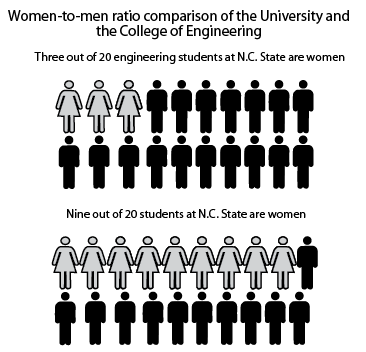With regard to quality, U.S. News ranks N.C. State 29th among public engineering schools. With its 12 departments and more than 20 laboratories, institutes and centers, the College of Engineering is one of the largest in the country.
But as is the case at many other engineering programs in the United States, women are underrepresented in the program as compared to other majors offered. And as is the case at many other schools, administrators and faculty members are working to bring more women into the field.
Like most courses of study, engineering was historically male-dominated. But even as women have caught up to and even surpassed men with regard to enrollment in many other majors, males still outnumber females four to one in the College of Engineering.
Laura Bottomley, director of Women in Engineering at N.C. State, acknowledged that the college remains something of a “boys club.”
Engineering disciplines deal with certain things—machines, cars, buildings and chemicals—that are statistically more appealing to men, according to Bottomley. However, she said the media creates narrow gender roles, which in turn lead more men toward engineering careers than women.
Jenna Pennock, a sophomore in engineering, said she has found a widening gender gap as she progresses toward a degree.
“Engineering is still predominantly a male field and I’m finding that the higher classes I take, the less females there are in my classes,” Pennock said.
Bottomley herself said she’s experienced firsthand the kind of intangible barriers women engineers face in the field. “I was once mistaken for the bus driver in a group because I was the only female engineer there,” she said.
As of 2009, the most recent statistic available, women made up 44.5 percent of N.C. State’s population and 16.7 percent of the College of Engineering. In comparison, women make up 17.9 percent of engineering students nationally.
The college has taken steps to accommodate and aid female engineering students. Several organizations on campus accommodate to female engineers, including Women in Engineering, Women In Science & Engineering (WISE), Society of Women Engineers (SWE), and Alpha Omega Epsilon Engineering Sorority (AOE).
N.C. State also belongs to Metronet, an online professional mentoring organization that connects females with professions in their field via email. Women in Engineering sponsors events throughout the year, include the ESCape Bridge Program for incoming female students.
Bottomley said regardless of the statistics, diversity in engineering will always be a good thing.
“The bottom line is that women and men are different,” Bottomley said. “A different approach to solving a problem does not invalidate anyone for any career that they are interested in. In fact, a diversity of approaches is what we urgently need in engineering.”





